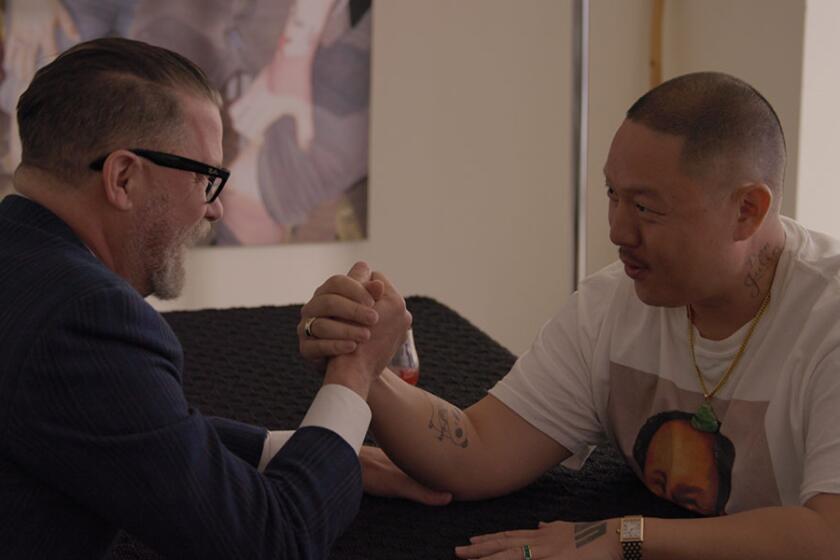Review: ‘Listen to Me Marlon’ presents a candid, introspective Brando

Kenneth Turan reviews “Listen to Me Marlon,” a documentary about Marlon Brando. Video by Jason H. Neubert.
Even in a summer that’s focused on creativity, with exceptional documentaries like “Amy” on Amy Winehouse and “What Happened, Miss Simone?” on Nina Simone, “Listen to Me Marlon” stands out. Autobiographical in nature, unconventional in structure, this is the story of Marlon Brando not as the world saw him but as he saw himself.
Written, directed and edited by Stevan Riley, “Listen to Me Marlon” wouldn’t exist if it wasn’t for hundreds of hours of audio recordings that the actor made over the course of his lifetime, tapes that have never been heard publicly until now.
Varying from expansive ruminations on acting and life to thoughts on specific roles and even including attempts at self-hypnosis (one of which gives the film its title), “Listen to Me Marlon” reveals Brando to be almost painfully sensitive and self-aware, a man with a questioning intelligence who could be piercingly candid about his life and work.
SIGN UP for the free Classic Hollywood newsletter >>
Added into the mix, in addition to a wide selection of clips from more than a dozen of the actor’s films, is a carefully curated collage of home movies, newsreels and TV interviews. We get to see color footage of Brando touching up his own makeup on the set of “On the Waterfront” and an excruciating 1955 appearance with his father on the Edward R. Murrow-hosted “Person to Person.”
And because Brando had his face digitized in the 1980s, we get to see a digitized version of the actor reciting the “sound and fury signifying nothing” soliloquy from “Macbeth.” “You watch,” he says impishly to his fellow performers. “Maybe this is the swan song for all of us.”
A revelatory, strikingly emotional look at a complex, troubled, enormously gifted man, “Listen to Me Marlon” is not told in strict chronological order, beginning with perhaps the most devastating event in the actor’s life, the killing of his daughter Cheyenne’s boyfriend by Brando’s son, Christian.
“Misery has come to my house,” Brando says in a startling public statement. “It’s been a struggle to try to preserve sanity and a sense of reality that’s been taken away from you by success.”
“Listen to Me Marlon” offers proof, despite occasional outbursts to the contrary, of how much Brando cared about acting, how seriously he took it, how consumed he was by the mechanics of getting it right.
Brando speaks messianically of wanting to “change the motion picture to something nearer the truth,” describes living with paralyzed war veterans for three weeks to nail down the nuances of his performance in “The Men” and talks admiringly of ballerina Galina Ulanova, who said, “If I could dance for one minute perfectly, that is all I’d ever ask.”
Yet the actor’s ambivalence and cynicism about his profession, especially as time went on, also gets its due. He says acting is lying for a living, proclaims he could have been a con man and insists “there are no artists, there is no art. It’s money, money, money. If you think it’s about something else you’re going to be bruised.”
Again and again, he returns to his miserable childhood, to his brutish father and the alcoholic mother who died when he was young. “If you’ve never been loved, you don’t know what it is,” he says, and when one of his children is born he swears, “My father is never going to come near that child because of the damage he did to me.”
Specific films that Brando deals with include “Mutiny on the Bounty,” a horrible experience despite his lifelong love of Tahiti, and “Last Tango in Paris,” where he felt betrayed because director Bernardo Bertolucci made use of elements from his own life.
Attention is also paid to Brando’s passion for the civil rights movement and the plight of native Americans. “I’ve always hated people trampling on other people,” he says, and he clearly meant it.
Toward the end, the actor came to see himself as “someone who’s taken too many punches. I don’t want to be hit anymore.” And yet he did seem to find a kind of peace about his profession. “Acting is just making things up,” he says, “But that’s OK.” Especially if you’re Marlon Brando.
------------
‘Listen to Me Marlon’
No MPAA rating
Running time: 1 hour 37 minutes
Playing at: Landmark, West Los Angeles
------------
MORE:
Cindy Williams to visit the Aero for ‘American Graffiti,’ ‘Conversation’ screenings
Portrait painting with Ben Kingsley
Bo Derek is in the path of a ‘Sharknado’
More to Read
Only good movies
Get the Indie Focus newsletter, Mark Olsen's weekly guide to the world of cinema.
You may occasionally receive promotional content from the Los Angeles Times.










